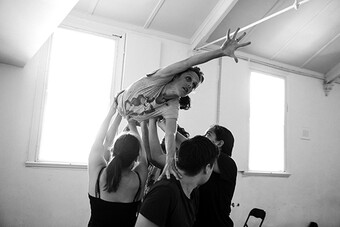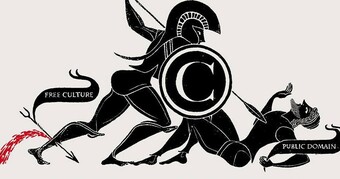Protecting, Distributing, and Monetizing Your Work Online
The #RightsWeek Series on HowlRound: What is the state of intellectual property? What are the rights of theatre artists and new work? In this series, Samuel French, Inc. asked four professionals in the theatre industry to share their thoughts on this subject. (Please note that the presented opinions are those of the author, and do not necessarily represent those of Samuel French.)
I’ve spent my eighteen-year career in professional theatre and music in New York City. I’m old enough to remember the emergence of the World Wide Web while I was in college in the early nineties, and the unfortunate concurrence of MP3 compression and peer-to-peer file sharing shortly thereafter.
There’s no question that major media industries—music, film, television, book publishing—have been historically slow to respond to changing technology.
Then, a little over a decade ago, the iTunes store provided the first popular solution to providing easy, quick, inexpensive access to legal music online.
In the last few years, we have seen an explosion in different services. Now we have YouTube, Pandora, Spotify, iTunes Radio, Amazon Prime, Deezer, Beats, and many other streaming services that provide much of the music people listen to many millions of times per day.
Although the rise of streaming services seems to correlate with a decrease in piracy, piracy certainly still exists, and publishers and trade organizations continue to actively fight it.
So what does this mean for the theatre, which depends mostly on 1) live performance, and 2) paper, for scripts and scores to transmit the information necessary to create that live performance? And how do playwrights, composers, and lyricists best promote their work online while also protecting it?
As with live music concerts, live theatre performance is generally doing well. There are certainly challenges, from high Broadway ticket prices, to drops in subscription audiences, to lack of inclusion. But that’s a topic for another essay.
Media and distribution is the main challenge.
Writers (and by writers, hereafter I include playwrights, composers, and lyricists) and licensing rental agents (e.g., Samuel French, Musical Theatre International (MTI), Rodgers & Hammerstein: An Imagem Company (R&H), Theatrical Rights Worldwide (TRW), Dramatists Play Services (DPS), etc.) are now considering how best to transmit rehearsal materials digitally. The best solution, in my opinion, would seem to be via a tablet app that allows for locked documents (to prevent piracy), instant revision updates from the writers (for new shows), and a closing night expiration date by which the materials would be remotely deleted (to prevent unauthorized future use).
In the retail market, play publishers (Samuel French, DPS, TCG), like book publishers, are venturing into e-book editions, some with terrific enhancements that can’t be done on paper. Sheet music publishers (Hal Leonard, Alfred, MusicNotes) have also become very active in getting songs available online for individual download, often with optional key transpositions.
If a writer’s career is at a point at which he or she has an agent and publisher, they will be able to help the writer take care of most of this, though keep in mind that a writer’s career is always in their own hands. Music publishers for theatre writers also have the resources, contacts, and institutional knowledge to negotiate deals at the best rates for use in film, TV, advertising, video games, and streaming.
So what do you do to distribute and protect your work before you have representation?
Let’s proceed from first principles. If you’re putting your work into the world, chances are (and one would hope) that it’s in a finished state, even if you revise it later. If so, register the copyright at www.copyright.gov. It’s easy and relatively inexpensive. Yes, your work is technically copyrighted the moment you fix it in a tangible medium of expression, but it’s better to have the protection of a registration. No, you don’t have to copyright each song individually—you can bundle them. No, you don’t have to reregister every revision.
Common practice is that it’s advisable to give part of it away to entice fans and potential producers, so select a few songs and make it streaming or pay-what-you-can via SoundCloud, BandCamp, or a similar service.
Likewise, become a member of The Dramatists Guild. If you’re a composer or lyricist, also join a performing rights organization (ASCAP or BMI) as both a writer and self-publisher. All of this is cheap and easy, and the benefits are significant, including income and grant award eligibility.

Second, as the saying goes, don’t give it all away for free, which cheapens its value in the marketplace and also makes it easier to pirate. You may not care about that now, but you will later. Common practice is that it’s advisable to give part of it away to entice fans and potential producers, so select a few songs and make it streaming or pay-what-you-can via SoundCloud, BandCamp, or a similar service. As for scripts, put the first 10 to 20 pages online as a sample. Anyone who is intrigued can ask you directly for the rest. If a potential producer or a network of literary managers wants to have a PDF of the entire script, watermark it. In the event you want to sell your script online, Amazon Publishing or a similar service can sell legitimate, protected e-books for you.
There are many writers who post terrible, under-rehearsed live performances with low-quality audio. Don’t do that.
Beware of posting live audio or video recordings, unless 1) they’re very good, and 2) you have permission from the performers and the venue. There are several theatre writers who have made a decent income and generated many fans via YouTube postings of their songs in concert/cabaret performances. The income comes from subsequent, related sales of online sheet music, not YouTube itself.
If you do upload videos to YouTube, you can monetize it to some extent by opting in to their ad service. There are many writers who post terrible, under-rehearsed live performances with low-quality audio. Don’t do that. Recording simple demos at home is easy and inexpensive now, as is finding willing performers in many cities.
If you want to sell your sheet music online, approach an online-only publisher like MusicNotes or NewMusicalTheatre, or sell it via e-commerce on your own site. Make sure the files are protected via code or watermark.
If you have an album or EP that you feel is ready for retail and you can’t get a label deal, consider using a service like Tunecore, which distributes to online stores for a low fee. Remember that you’ll have to do all the marketing yourself.
Throughout all of this, keep in mind that you should never sign a contract (other than a standard website terms-of-service) without having a knowledgeable person look it over for you. Be very wary of any entity who wants you to sign over any part of your copyright (with the exception of music co-publishing agreements, which usually involve a significant monetary advance on royalties).
I hope that this is a useful primer on the basics, and I welcome further discussion.









Comments
The article is just the start of the conversation—we want to know what you think about this subject, too! HowlRound is a space for knowledge-sharing, and we welcome spirited, thoughtful, and on-topic dialogue. Find our full comments policy here
"The best solution, in my opinion, would seem to be via a tablet app that allows for locked documents (to prevent piracy), instant revision updates from the writers (for new shows), and a closing night expiration date by which the materials would be remotely deleted (to prevent unauthorized future use)."
How is this a great solution? In the past, you would simply send them the script printed on paper, which can be scanned and OCRed in about 5 minutes. Does making theaters jump through all these DRM hoops really prevent piracy? And does that piracy really hurt the playwright?
Isn't it the best thing for a playwright to have their work spread far and wide so that it might actually lead to a production? Isn't getting produced the real goal? It's not like lots of people read plays for fun. Most people who read plays are people who might someday have some leverage to produce it, but they'll never read and a fall in love with your play if you make it hard for them to read it. A playwright these days should be lucky to get pirated.
Yes, having a production is the more important goal than selling copies of a script for private reading purposes, but both are protected by copyright and represent income to the author. Most publishers and licensors make scripts readily available to potential producers and I'm sure that will continue. My proposed solution in the article above is intended for theatres producing a licensed production and using tablet technology, so that the licensing agent (on behalf of the author) can attempt to control the number of digital copies of scripts out there in the world, and also make sure that the materials are the most current version approved by the author. This isn't a DRM hoop, and it's much simpler, less costly, and less harmful to the environment than the current system. There are certainly unauthorized, unlicensed productions out there. Yes, photocopiers and scanners have unfortunately facilitated piracy, but that doesn't mean we should give up trying to protect authors' rights.
Sean Patrick Flahaven
Great article man. I'm really glad that theater people are finally starting to have a dialogue about piracy. It's very necessary. However- spotify and the other streaming services you mentioned are still REALLY BAD NEWS for artists monetarily-speaking as they mostly only benefit the software designers who created them (Meet the new boss same as the old boss, amiright?). I could say similar things in regards to Itunes. I'd suggest reading this article by Damon Kurkowski of Galaxie 500 on this subject: http://pitchfork.com/featur...
In addition, I'd google statements RE: Spotify by Thom Yorke, The Black Keys and various other established artists who are anti streaming services. I look forward to hopefully seeing you at the piracy panel tomorrow in Manhattan! Best of luck!
Here's that Thom Yorke article: http://www.theguardian.com/...
Thom Yorke calls Spotify 'the last desperate fart of a dying corpse'